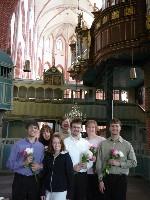News & Events
Students and Alumni Participate in Historic Organ Study Trip
Posted on Monday, July 14, 2008
Three Westminster College students and three recent graduates participated in a study trip to Germany and the Netherlands offered by the Westminster Historic Organ Program and led by Dr. Elizabeth Harrison, director of the Westminster Historic Organ Program.
The participants in this study of historic organs from the 15th to the 18th centuries were:
Melissa Barnes, a 2008 Westminster College graduate who majored in music education, is a daughter of Brett and Christine Barnes of Saline, Mich., and a graduate of Saline Area High School.
Shelley Culver is a 2007 Westminster College graduate who majored in music education.
Nicholas Drabik, a sophomore sacred music major, is a son of Mitchell and Maura Drabik of Sandy Hook, Conn., and a graduate of Newtown High School.
Craig Dressler, a 2008 Westminster graduate who majored in religion and music, is a son of Douglas and Diane Dressler of Erie and a graduate of McDowell High School.
Amanda Gentzel, a senior sacred music and computer science major, is a daughter of David and Margaret Gentzel of Wexford and a graduate of Pine-Richland High School.
Christopher Granger, a junior music education major, is a son of Jon and Janet Granger of Warren and a graduate of Youngsville High School.
The 15-day study began May 13 in the small village of Cappel in North Germany, which boasts a 1680 organ built by the famous Baroque organ builder, Arp Schnitger. This organ is in almost original condition, including its front pipes, which escaped the World War I use for war materials due to the fact that there was no paved road to this small village just a mile from the North Sea.
The week in Cappel allowed unlimited practice time on the Schnitger organ as well as an opportunity to gain experience with Schnitger organs in Dedesdorf (a rural church organ, 1698), Stade (first organ built by Schnitger, 1675), Ludingworth (1683), as well as with organs by other builders from the seventeenth and eighteenth centuries. In all the churches each participant not only heard the instrument, but also played the instrument for several hours, so they were at home with the sounds, the feel, and the music.
Professor Harald Vogel, the world's leading expert on Renaissance and Baroque German organs and organ repertoire, hosted the group during their Osterholz-Scharmbeck visit to the Beilfeldt organ built in 1734. Following Vogel's private concert, he coached the students on pieces they had prepared for this study, and then treated the group to tea and pastries at his home.
Harrison arranged for the students to perform a public concert on the large Schnitger organ, 1688, in St. Ludger's Church in Norden, Germany, where the group spent most of the second week. This concert began with Granger's performance of Bach's D-minor Toccata and Fugue; Drabik and Dressler played pieces by the 17th-century North German composer, Heinrich Scheidemann. Gentzel performed Dietrich Buxtehude's virtuosic Toccata in D Minor, and Culver played a piece written for Pentecost Sunday by the 17th-century Hamburg organist Franz Tunder.
Culver said, "Norden will always be one of my favorite instruments. I learned so much from listening to the instrument and finding out how the music sounded in the time period for which it was written. Now I can bring back new ideas that benefit my graduate work at the University of Illinois - my research, my performances - and my church job."
In between practice times in Norden, students visited a host of other nearby historical and historical-style instruments. Dressler commented that these instruments "provided a broader context for the North German instruments and offered an educational experience like none I've experienced before. The Italian and French organs gave me an opportunity to compare those sounds and styles to the antique German organs and left me with an understanding of those musical styles and traditions that I would not otherwise have had."
The final highlight of the trip was a visit to the workshop of the famous Dutch organ builder, Henk van Eeken, known for his carefully researched restoration techniques and outstanding new instruments. Eeken treated the students to a tour of his workshop, including his design facilities, explanations of pipe making, explanations on metal casting and woodworking, and a partially erected new instrument for Meiji Gakuim University in Japan. The day with Eeken concluded with a home cooked Indonesian dinner where conversations continued about organ construction.
Gentzel explained that prior to this trip "I felt like I really knew nothing about organs and organ construction. After Henk's thorough explanations, I know quite a bit. I enjoyed learning how he makes pipes and designs organs. In general, visiting his workshop was an amazing learning experience that left me with a much better understanding of organs and how they work."
During this two-week study tour, the Westminster College group visited over 20 historical instruments and several designed using historically informed building techniques. Harrison said, "It's important for every musician to understand the history of their instrument. In the organ world, such knowledge is even more important because so many of the antique instruments have lasted for hundreds of years. Today's best organ builders in the United States, Europe, and Asia are imitating the old styles of building in the hope of creating instruments that will last several hundred years more."
The Westminster Historic Organ Program was founded in 2001 by Harrison as an independent organization to assist organ students, organ professors, and professional organists to experience historical and historical-style instruments. Students and/or professors from institutions, including Eastman School of Music, the New England Conservatory, and The University of Illinois, have participated in tours or booked their own individual tours through the Historic Organ Program. In 2008 nearly a hundred students from across the United States and Europe will participate in various tours organized by Harrison and the Westminster Historic Organ Program.
For more information, visit www.westminsterhistoricorganprogram.org.

More Stories



